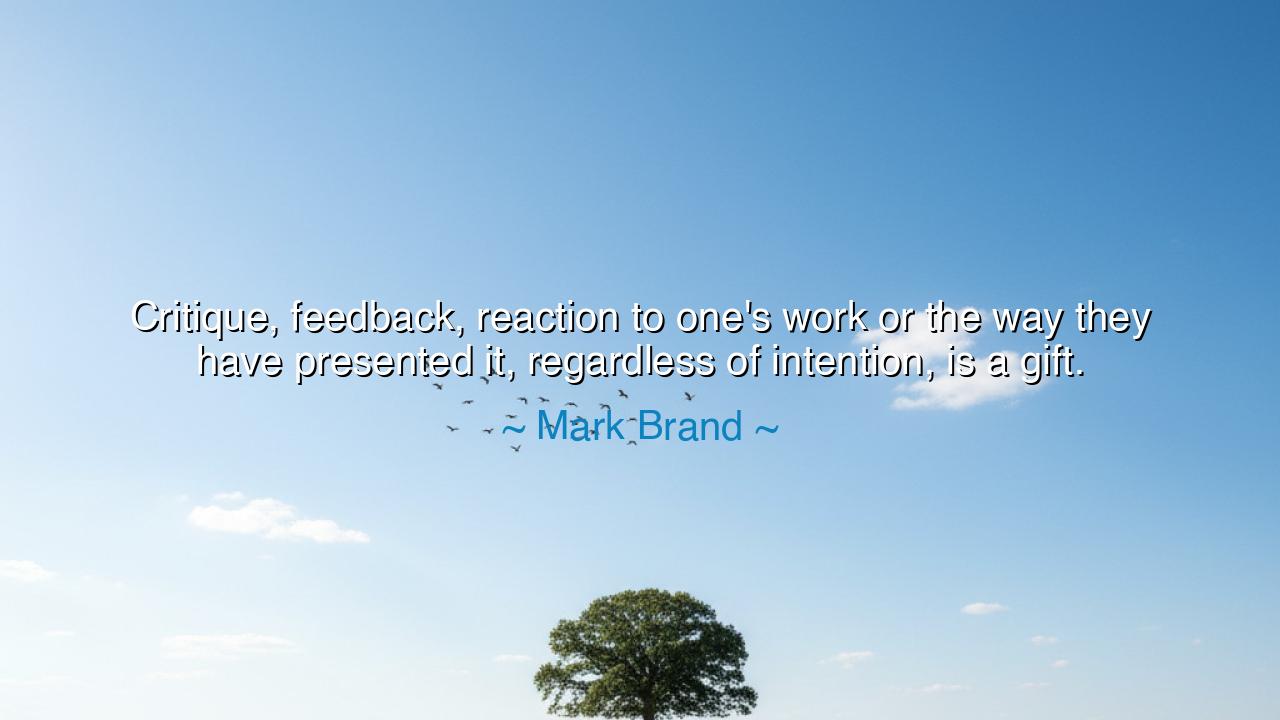
Critique, feedback, reaction to one's work or the way they have
Critique, feedback, reaction to one's work or the way they have presented it, regardless of intention, is a gift.






The words of Mark Brand, “Critique, feedback, reaction to one’s work or the way they have presented it, regardless of intention, is a gift,” shine like a lantern for all who labor in creation. They remind us that the judgment of others, whether gentle or harsh, is not a curse but a blessing. For through critique, the craftsman sees what he himself may be blind to, and through feedback, his work is refined as iron is sharpened by iron.
The essence of this saying lies in the truth that every reaction holds value, no matter its tone or motive. Even words spoken without kindness may reveal a hidden flaw, or stir within the artist a deeper resolve. Thus, all voices become teachers, and every encounter with the opinion of another becomes a stepping stone on the path of mastery. To despise correction is to choose ignorance; to welcome it is to grow wise.
The origin of these words rests in the reflections of Mark Brand, a man of many crafts, who understood that creation does not exist in isolation. The potter’s vessel, the poet’s verse, the leader’s vision—all are tested in the eyes and hearts of others. In calling critique a gift, he reclaims what many fear, transforming judgment into nourishment for the soul and fuel for progress.
Let it be remembered by all who create and all who strive: pride resists, but wisdom receives. The hands that are willing to shape again, the mind that is willing to listen, and the heart that is willing to accept correction will rise higher than those who shut their ears. For in every critique, every feedback, every reaction, there is the whisper of destiny guiding us toward excellence. And those who embrace it will find their work not diminished, but made immortal.






RSrin susu
I love this idea that feedback, no matter how it’s delivered, is a gift. It reminds me that we can always learn something, even from difficult criticism. But how do we maintain the right mindset when receiving feedback, especially when it feels harsh or critical of our work? What strategies can help us not only accept feedback but actively seek it out, knowing it will ultimately help us improve?
NNguyencaoviettri
Mark Brand’s perspective on feedback as a gift is an interesting take. I agree that feedback is essential for growth, but sometimes it feels like we focus too much on others' reactions to our work instead of trusting our instincts. How do we find the balance between using external feedback constructively and staying true to our own vision? How do we stay grounded and not lose confidence when faced with feedback we may not agree with?
NHNgoc Ha
This quote makes me reflect on the power of feedback. It’s true that receiving reactions to our work can provide valuable insights, but it also requires us to be vulnerable. How do we stay open to feedback without feeling disheartened or defensive? What strategies can we use to approach criticism as a learning opportunity instead of taking it personally? I think that’s where growth happens—but it’s not always easy.
TMVo Thi Tra My
Mark Brand’s quote emphasizes the value of feedback, regardless of the intention behind it. But does that mean we should always accept feedback, even when it feels unwarranted or unhelpful? How do we differentiate between constructive criticism and feedback that’s more about personal biases or preferences? I wonder if there’s a fine line between accepting critique and blindly accepting anything that comes our way.
CGLuu Chau Giang
I agree with the sentiment that feedback is a gift, but I also wonder—can all types of feedback really be helpful? Is there a point where criticism becomes too harsh to be constructive? How do we ensure that feedback is truly useful, rather than just an expression of personal opinion? I’d love to hear others' experiences on how they’ve learned to embrace feedback, even when it was difficult to hear.